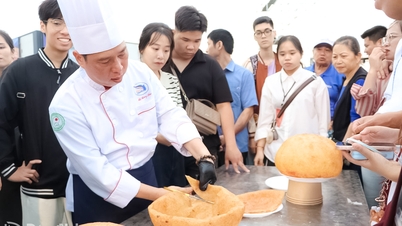When the weather turns to autumn, the body is sensitive to cold winds and temperature changes. Familiar herbs and spices in the Vietnamese kitchen not only make dishes more delicious but also help increase resistance, keep the body warm and prevent diseases according to both Eastern medicine and modern scientific research.
When the seasons change, herbs become medicinal herbs in the kitchen.
The change of seasons makes many people susceptible to sneezing, stuffy nose, sore throat, aches and pains or mild flu. According to Oriental medicine, autumn is the time to focus on nourishing the lungs, replenishing yin and keeping the body warm.

When the seasons change, herbs become medicinal herbs in the kitchen (Photo: Getty).
More than just spices, many herbs also contain essential oils and natural compounds that have antibacterial, anti-inflammatory, digestive, and immune-boosting properties.
Some modern studies show that these vegetables contain many antioxidants such as polyphenols, flavonoids, and vitamin C, which help protect cells and reduce the impact of cold weather on the respiratory tract.
Vietnamese coriander warms the stomach and eliminates cold
Vietnamese coriander has a spicy, warm taste and a distinctive strong aroma. This is an indispensable vegetable when eating balut, eel porridge or chicken salad, helping to remove the fishy smell, stimulate the taste buds and warm the stomach.
According to Oriental medicine, Vietnamese coriander helps with digestion, expels wind and cold, reduces abdominal pain and treats eczema and scabies. Modern research also shows that the essential oil in Vietnamese coriander contains antibacterial and antifungal compounds, which help protect the digestive system and reduce bloating and indigestion.
Dill makes the soup fragrant and warms the whole body.

Dill is not only fragrant but also good for health (Photo: Getty).
Dill is considered the “soul” of many fish or snail soups. Not only does it eliminate fishy smells, this herb also helps stimulate digestion, reduce bloating and warm the body.
In Oriental medicine, dill has a spicy, warm taste, helps strengthen the spleen, circulate qi, and warm the kidneys. Some studies show that dill essential oil contains carvone and limonene, which have antibacterial and antioxidant effects and help reduce stomach spasms. A little dill in a pot of soup on a cold day can make the meal more delicious and warm the heart.
Coriander is a valuable medicine for the digestive system.
Coriander is often used in pho noodles. This herb has a mild spicy taste and warm properties, helps stimulate digestion and aids in detoxifying the body.
According to traditional medicine, coriander can help with digestion, expel wind, and promote urination. Modern scientists have also noted that coriander seeds and leaves contain vitamins A, C, and K, along with the active ingredient linalool, which has antibacterial properties and is good for the liver and stomach.
Coriander stimulates taste buds and aids digestion.
Coriander, also known as Vietnamese coriander, has a spicy, warm taste and a distinctive aroma. Vietnamese people often use it to cook sour soup, broth or eat with grilled dishes and beef noodle soup.
According to Oriental medicine, eryngium helps to reduce heat, purify impurities, and strengthen the spleen and stomach. Some nutritional studies show that eryngium extract has the ability to inhibit intestinal bacteria, helping to reduce diarrhea and bloating. Thanks to that, the dish is more attractive and the body is more comfortable on dry days.
Lemon basil: "Nemesis" of flu
Lemon basil has a sour taste, pungent aroma, warm properties, and is often used in folk remedies to treat coughs, colds, and sore throats.
Fresh lemon basil leaves can be eaten raw, crushed to make a drink, or steamed with honey to reduce coughs and clear phlegm. Lemon basil essential oil contains carvacrol and thymol, two active ingredients with strong antibacterial properties, helping to soothe the throat, reduce inflammation of the respiratory tract, and increase natural immunity.
Source: https://dantri.com.vn/suc-khoe/mon-hay-an-cung-bun-pho-la-thuoc-quy-luc-giao-mua-20251108124351015.htm

































































































![Dong Nai OCOP transition: [Article 3] Linking tourism with OCOP product consumption](https://vphoto.vietnam.vn/thumb/402x226/vietnam/resource/IMAGE/2025/11/10/1762739199309_1324-2740-7_n-162543_981.jpeg)












Comment (0)